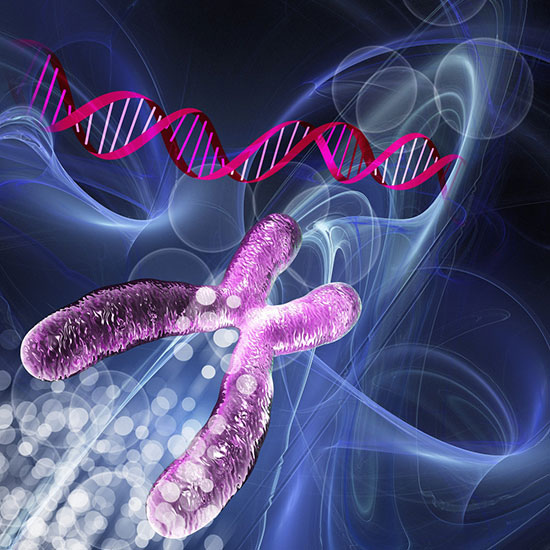


Genetics research, conceptual artwork. [PHOTO/CHINA DAILY]
Medical experts and authorities in South China will compile a list of ethics regulations for human biomedical studies, a move that comes on the heels of strong condemnation of a Chinese researcher who claimed to have made the world's first genetically edited babies.
A meeting to discuss new regulations was held in Guangdong province by Shenzhen PKU-HKUST Medical Center on Tuesday. The center is a research institution established by the Shenzhen government, Peking University and the Hong Kong University of Science and Technology.
The Health and Family Planning Commission of Shenzhen told China Daily that drawing up such regulations was already in the annual plan for this year and has "no relation with other events".
Biological researcher He Jiankui announced last month that twin baby girls had been born in Shenzhen after their embryos were genetically edited for immunity to HIV infection.
In a signed statement, more than 120 scholars from prestigious universities and institutes strongly condemned the research, saying it lacked proper ethical oversight and amounted to experimentation on humans.
Lei Ruipeng, a professor of philosophy of biological science at Huazhong University of Science and Technology, told Science and Technology Daily that the case revealed issues about the supervision and review of biomedical research ethics in medical and health organizations.
She believes improving scientific ethics is an issue that can't be avoided if the country wants to become a powerful technology giant.
Ethics regulations for human-related research were set out by the former National Health and Family Planning Commission-now the National Health Commission-in 2007 and renewed in 2016.
In 2015, Shanghai released China's first regional rule-the Standards and Operational Guidance for Ethical Review of Biomedical Research Involved Human Participants.
The Shenzhen government established its own ethics review committee in April 2017, and all human research is required to be examined by the committee.
Xiao Ping, director of the committee, hosted several meetings this year to draft a regional standard for medical science ethics, including a review process, categories, quality control and evaluation system.
Zhai Xiaomei, a professor and deputy director of the Center for Bioethics of the Chinese Academy of Medical Sciences, said the national guidance on medical science ethics is already comprehensive, so the key for national and regional regulations is implementation and supervision.
 Fire brigade in Shanghai holds group wedding
Fire brigade in Shanghai holds group wedding Tourists enjoy ice sculptures in Datan Town, north China
Tourists enjoy ice sculptures in Datan Town, north China Sunset scenery of Dayan Pagoda in Xi'an
Sunset scenery of Dayan Pagoda in Xi'an Tourists have fun at scenic spot in Nanlong Town, NW China
Tourists have fun at scenic spot in Nanlong Town, NW China Harbin attracts tourists by making best use of ice in winter
Harbin attracts tourists by making best use of ice in winter In pics: FIS Alpine Ski Women's World Cup Slalom
In pics: FIS Alpine Ski Women's World Cup Slalom Black-necked cranes rest at reservoir in Lhunzhub County, Lhasa
Black-necked cranes rest at reservoir in Lhunzhub County, Lhasa China's FAST telescope will be available to foreign scientists in April
China's FAST telescope will be available to foreign scientists in April "She power" plays indispensable role in poverty alleviation
"She power" plays indispensable role in poverty alleviation Top 10 world news events of People's Daily in 2020
Top 10 world news events of People's Daily in 2020 Top 10 China news events of People's Daily in 2020
Top 10 China news events of People's Daily in 2020 Top 10 media buzzwords of 2020
Top 10 media buzzwords of 2020 Year-ender:10 major tourism stories of 2020
Year-ender:10 major tourism stories of 2020 No interference in Venezuelan issues
No interference in Venezuelan issues
 Biz prepares for trade spat
Biz prepares for trade spat
 Broadcasting Continent
Broadcasting Continent Australia wins Chinese CEOs as US loses
Australia wins Chinese CEOs as US loses